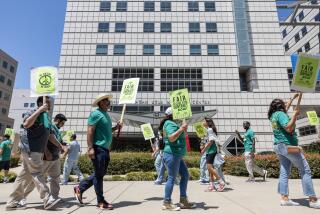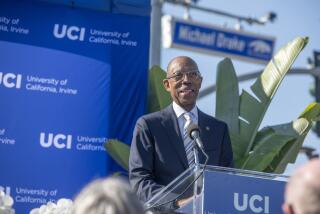Grad Students Set to Strike at UCI, Elsewhere
The union representing teaching assistants for the University of California system, including UC Irvine, announced Sunday that the assistants will strike at eight campuses Tuesday, just before final exams for the fall term.
Officials of the Student Assn. of Graduate Employees, an affiliate of the United Auto Workers union, said the strike will begin at all UC campuses except the medical and health sciences school in San Francisco.
Over the last 15 years, the union has been rebuffed in its efforts to be recognized by the university system, which has maintained that the graduate students who take on part-time teaching duties are students more than employees.
UCI officials said the strike might affect some courses, but the overall effect on undergraduate education will be minimal and that campus life would be largely unaffected. At UCI, the last week of class for the fall term begins today, with final exams to run Dec. 7-11. The start of the next quarter is Jan. 4.
“We expect there will be a few courses where faculty will have to mobilize colleagues to get final exams graded and as a result there might be some delay in getting grades in,” said Professor William Parker, associate executive vice chancellor at UCI.
A union representative said pickets will be at all of the affected UC campuses and will ask delivery workers to honor the picket lines. It also will ask other university employees to not do the work of striking employees.
“I think the university underestimates how much work we put in,” said Michelle Grisat, a member of the student workers union at UCI. “We do 60% of the face-to-face teaching. I want to question how they think they’ll be able to replace us. I don’t know what shortcuts they’re planning on taking. It certainly won’t be the same quality of education for the students.”
The workers--including readers, who grade papers, and tutors as well as teaching assistants--earn about $14,000 for half-time work over nine months and the equivalent of $4,000 more in benefits, including student fees and health insurance.
At issue is whether the union can represent the roughly 9,000 graduate teaching assistants systemwide who receive stipends for teaching undergraduates, often in discussion sections of large university lectures.
“The university has taken the position that unionization is not in the best interest of students or the university,” Parker said. “Teaching assistants are primarily students, and a union would complicate the relationship between the university and the students.”
The union has sought since June to force the university to recognize it as the bargaining agent for the graduate student employees. At UCI, a majority of the 1,072 teaching assistants, tutors and readers signed cards this year supporting the union as its bargaining agent, but the university has refused to recognize it.
UCI Chancellor Ralph J. Cicerone reiterated in a letter sent this month to faculty that their primary responsibility in the event of a walkout would be to “ensure that undergraduate education continues uninterrupted.”
Undergraduate Dean James Danziger and Academic Senate Chair James Fallon also wrote to colleagues advising them that flexibility would be necessary in case of a strike. They suggested faculty might adjust final exam schedules and make other provisions for ensuring that graduating students get timely grades.
University officials also said that other unions on campus have no-strike clauses in their contracts and would be expected to honor them and not the picket lines.
UCI will take no punitive action against striking teaching assistants other than the loss of their pay, Parker said.
“We keep those things separate,” he said. “We will clearly keep the academic standing separate from employees’ status based on the assumption that work stoppage will only affect this semester.”
According to UC estimates, teaching assistants actually teach about 15% of undergraduate courses. But association officials say the assistants are responsible for about 60% of all face-to-face instruction on the undergraduate level.
At UCI, the teaching assistants handle roughly 800 discussion sections, Danziger said.
Parker acknowledged that it remains unclear what sort of stopgap measures might be necessary to ensure the smooth running of this week’s classes.
“We won’t know until Tuesday just how extensive the withholding of services will be,” he said.
In a formal statement issued last week, Richard C. Atkinson, president of the University of California, said the system considers teaching assistants as “principally” students, not employees, and therefore not entitled to collective bargaining.
Unionizing teaching assistants “would disrupt the collegial relationships between students and faculty that are so critical to graduate work,” Atkinson said in a Nov. 23 letter to university officials, faculty and staff.
Times staff writers Dan Weikel and Kenneth R. Weiss contributed to this report.
More to Read
Sign up for Essential California
The most important California stories and recommendations in your inbox every morning.
You may occasionally receive promotional content from the Los Angeles Times.










